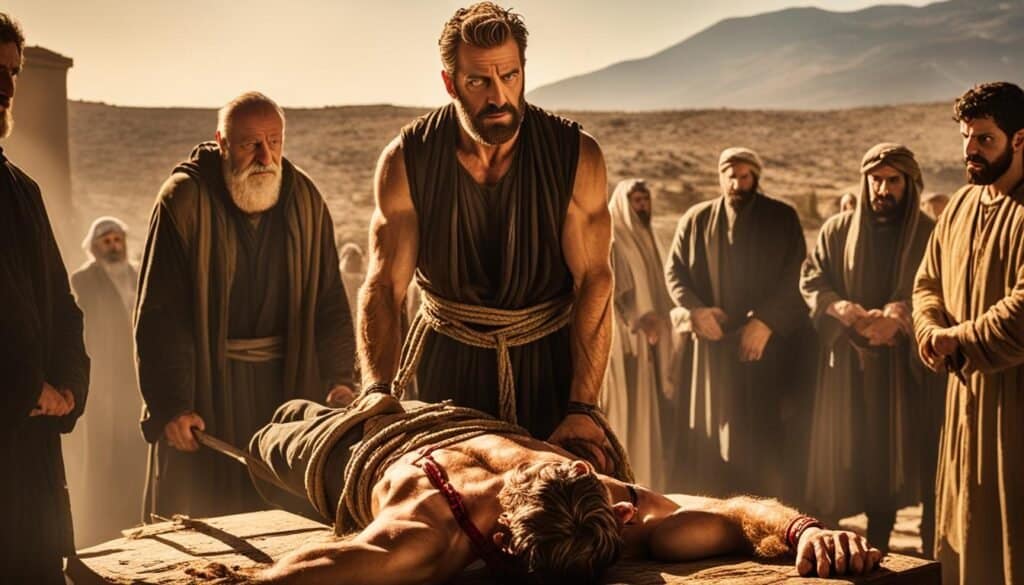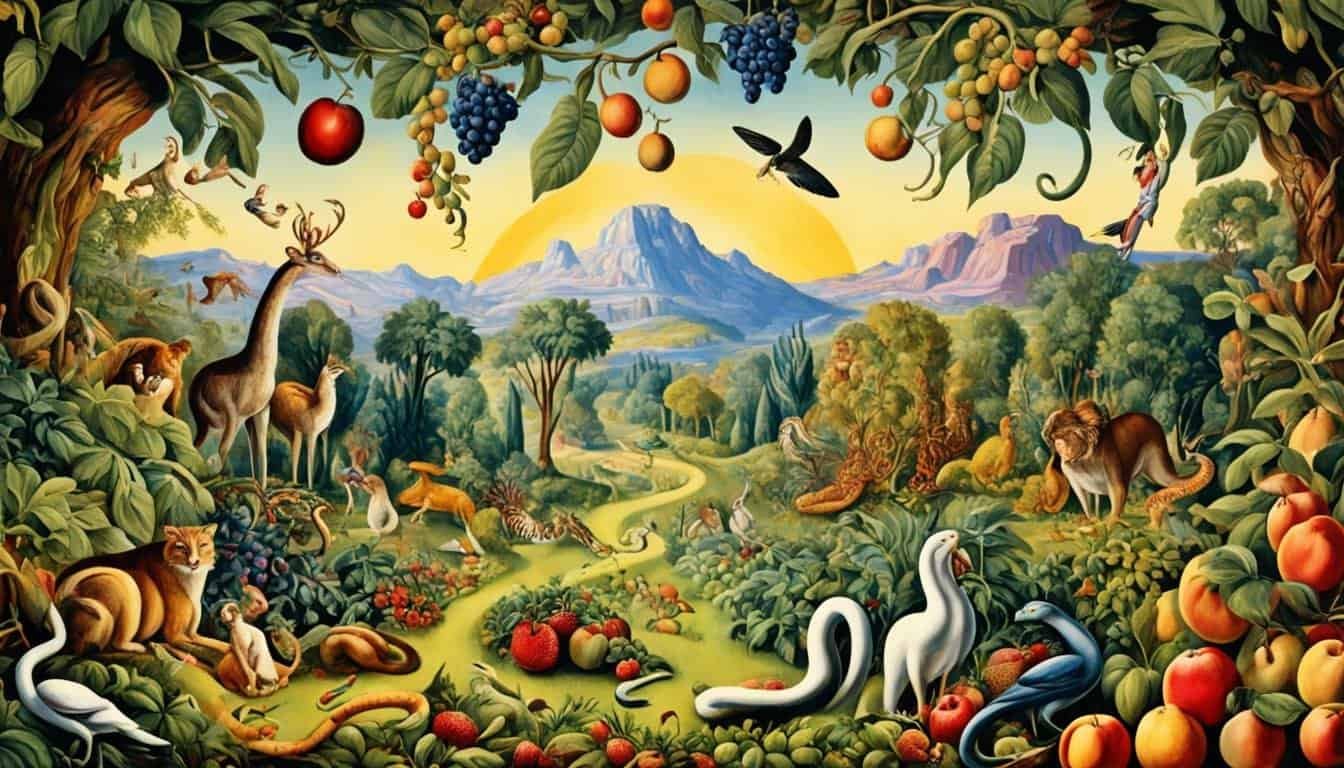Welcome to our journey through the top 10 most controversial stories in Genesis. These ancient tales might challenge what you believe and spark your curiosity. They cover everything from how the universe began to the Tower of Babel.
These stories shape how we see faith, morality, and what makes us human. Ever wondered why they cause so much debate and discussion? What about these stories keeps us coming back for more? Join us as we explore the deep controversies hidden in Genesis.
Key Takeaways:
- Genesis contains stories that have sparked debate and discussion throughout history.
- These controversial tales shape our understanding of faith, morality, and human nature.
- There is a wide range of topics within Genesis that challenge common beliefs and notions.
- Interpretations of these stories vary among different religious traditions.
- The controversies within Genesis continue to engage readers today.
The Creation of the Universe
The book of Genesis starts with a story of how everything was made. It tells us that God created the universe in six days. This includes the sky, earth, plants, animals, and people. Many people have discussed this story for years, leading to various thoughts and beliefs.
“And God said, ‘Let there be light,’ and there was light.” – Genesis 1:3
This creation story shows us that God made everything with a plan and reason. It shows that there is a powerful force behind everything in the world. The story also opens up conversations about the beginning of the world, and science’s role in it.
People from different fields like science and religion have tried to understand this story. Some believe it is true exactly as it is written. Others think it is a way to explain the start of everything in a symbolic way.
The story from Genesis makes us think about big questions. Like why we are here, what our purpose is, and how we connect to the rest of the world. It encourages us to admire the beauty of nature and think about our role in it.
The Fall of Man and the Introduction of Sin
In our third look at Genesis, we find the story of the Fall of Man. It’s about when Adam and Eve give in to temptation. This act goes against God’s command.
The tale starts with a clever serpent. It tricks Eve into eating from the forbidden tree. After eating the fruit, they realize their mistake and its immediate consequences.
This event starts a chain of disobedience to God. It brings sin into human lives. Because of this, the once perfect bond between humans and God breaks.
This narrative shows how our choices and desires can lead us astray. It encourages us to think about our decisions. And it highlights the need to follow God’s guidance.
“But of the tree of the knowledge of good and evil you shall not eat, for in the day that you eat of it you shall surely die.” – Genesis 2:17
The Consequences and Redemption
Adam and Eve face many hardships after their mistake. They feel shame and guilt for the first time. Their lives become filled with pain and hard work.
Yet, there is still hope. God promises a Savior to fix the broken bond with humanity. This sets the stage for Jesus Christ’s arrival to save us all.
Let’s ponder on temptation, disobedience, and hope for redemption. The Fall of Man shows our fragile bond with God. Our choices affect not just us but the whole world.

| Key Elements | Implications |
|---|---|
| The Temptation of Eve | Highlights the power of temptation and human vulnerability. |
| The Introduction of Sin | Explores the consequences of disobedience and the enduring impact of sin on humanity. |
| The Broken Relationship with God | Examines the loss of innocence and the separation between humanity and God. |
| The Hope of Redemption | Offers a glimpse of divine grace and the promise of salvation through Jesus Christ. |
Cain and Abel: The First Murder
In Genesis 4, we learn about Cain and Abel. It’s a story filled with lessons about human relationships. It shows us how envy and violence can destroy lives. Cain and Abel gave offerings to God, but God favored Abel’s.
Feeling jealous, Cain invited Abel to the fields where he killed him. This was the very first murder recorded. The story shows envy’s destructive power and the bad outcomes when we give in to such feelings.
This story warns us to control our feelings and solve conflicts without violence. It makes us think about evil’s roots and human fragility.
People have analyzed the story of Cain and Abel in many ways. It teaches about sibling rivalry, how to handle anger, and the complex nature of morality and divine judgment.
“And the LORD said to Cain, ‘Where is Abel your brother?’ And he said, ‘I do not know. Am I my brother’s keeper?'” – Genesis 4:9
This quote shows our duty to care for others. It stresses the need for kindness, understanding, and being responsible for each other.
The Consequences of Cain’s Actions
After his crime, God punished Cain with exile. This curse shows how our actions can affect our lives and others’. It teaches us to think about the results of what we do.
This story also gets us thinking about justice and divine will. It challenges us to examine human nature and the importance of being responsible for our actions.
A Dual Symbolism: Cain and Abel in Christian and Jewish Traditions
In both Christian and Jewish traditions, Cain and Abel’s story is symbolic. Christians see Cain as a symbol of sin and Abel as a symbol of virtue and suffering. Their fates show the value of faith and repentance.
Jewish texts interpret Cain’s actions as a caution against harmful impulses. This story highlights the significance of personal choice, awareness, and righteousness.
| Key Themes | Lessons Learned |
|---|---|
| Envy and jealousy | Awareness of our emotions and their effects on relationships |
| Moral responsibility | Our duty to answer for our actions and their outcomes |
| Divine judgement | Understanding justice’s complexities and divine involvement |
The Curse on Eve
In the book of Genesis, the story of Eve’s disobedience unfolds. She ate the forbidden fruit from the Tree of Knowledge. This action led God to pronounce a curse on her. This curse impacts human relationships and sparks debates today.
God said Eve’s childbirth pains would increase. This shows the toll childbirth takes on mothers. It makes us think about pain and how it tests and strengthens us.
God also stated that Eve would desire her husband, but he would have authority over her. Some see this as a yearning for closeness. Others view it as a power struggle in relationships. It makes us question gender roles and equality in relationships.
The story of Eve’s curse has been debated for centuries. Its effects are still considered by theologians and believers today. Its deep impact continues to be explored in religious discussions.
“Exploring Eve’s curse helps us see outcomes of human acts and God’s complex justice. It lets us ponder our relationships’ joys and trials. We learn to understand and respect each other better.”
When considering the Curse on Eve, we need to be thoughtful. We should remember its historical and cultural background. By analyzing this text, we learn about human nature, power dynamics, and the results of our actions.

The Curse on Eve: A Table of Key Symbolism
| Symbol | Interpretation |
|---|---|
| Pain of Childbirth | A constant reminder of disobedience’s fallout and motherhood’s challenges. |
| Desire for Husband | A look into the complex nature of close relationships and power dynamics. |
The Binding of Isaac: A Test of Faith
In the story of The Binding of Isaac, Abraham faces a tough test. God asks him to sacrifice his son, Isaac. This story from Genesis 22 digs deep into ethical and spiritual questions. It keeps readers thinking.

The tale shows a difficult moral choice. Abraham, known for strong faith, faces a heartbreaking call. A father asked to sacrifice his son stirs deep unease. It makes us think about obedience, sacrifice, and human trials.
“Abraham, take your son, your only son Isaac, whom you love, and go to the land of Moriah, and offer him there as a burnt offering…” (Genesis 22:2a)
The Binding of Isaac story makes us look at faith’s depth. It asks if we could follow divine directions against our personal values. It questions God’s tests, our compliance, and the deep sacrifices faith may require.
Unwavering Trust in God
Abraham’s solid trust in God stands out in this story. Despite his emotional pain, Abraham follows God’s order fully. This highlights Abraham’s deep faith and trust in God’s wisdom.
The Substitutionary Sacrifice
As Abraham nearly sacrifices Isaac, God stops him and provides a ram instead. This shows God’s mercy and the importance of life. It points out God seeks our complete dedication, not actual child sacrifice.
Theological Significance
The Binding of Isaac has big spiritual meaning. It affects views on sacrifice, redemption, and divine will. It hints at substitutionary atonement, a vital idea in Judeo-Christian beliefs, showcased by Jesus Christ as the ultimate sacrifice.
Varying Interpretations
People have seen the Binding of Isaac in different ways over time. Some focus on Abraham’s faith. Others question the morality of such a divine test. This story prompts deep thinking about faith, morality, and God’s mysterious ways.
Reflecting on the Binding of Isaac story, we dive into faith, obedience, and sacrifice themes. It pushes us to consider our own beliefs and our openness to a greater purpose. This story’s legacy remains strong, stimulating theological discussions and deep thoughts on our divine relationship.
Judah and Tamar: Deception and Redemption
Let’s explore the story of Judah and Tamar from Genesis 38. The story begins when Judah won’t find a husband for Tamar, his daughter-in-law. Facing injustice, Tamar decides to take control of her future with a bold plan.
Tamar disguises herself as a prostitute and waits for Judah at a crossroads. Not recognizing her, Judah interacts with her, thinking she’s someone else. Tamar cleverly asks for his belongings as a promise for payment.
When Tamar’s pregnancy is revealed, Judah has to face the truth. In a turning point, Tamar shows herself as the woman from before. She does this by showing his own belongings.
“I am pregnant by the man who owns these,” Tamar boldly declares, presenting Judah with his own personal belongings.
This narrative digs into complex ethical questions and shows how far people will go for justice and righteousness. It makes us think about human relationships and how God uses them to create redemption and healing.
The tale of Judah and Tamar might be full of controversy. Yet, it teaches us that God’s work can transform deception into an opportunity for redemption and change.
Sodom and Gomorrah: Destruction and Divine Judgment

Let’s delve into the story of Sodom and Gomorrah. These cities were destroyed due to their evil deeds. It’s a clear example of God’s judgment on wrong-doing.
Genesis 19 shows us the bad actions of Sodom and Gomorrah’s people. They did many wrong things, and God heard about it. So, God decided to punish these cities to show His justice.
Then we meet Lot and his family in the story. Lot was a good man surrounded by badness. He welcomed two angels into his home, risking danger from his neighbors.
“‘Bring them out to us so that we can have sex with them,’ the men of the city demanded. Lot tried to stop them by offering his daughters instead. But the city was too far gone in its wicked ways.”*
Lot’s family had to leave quickly without looking back. Sadly, Lot’s wife looked back and turned into a pillar of salt. This shows what happens when we don’t follow God’s commands.
The tale of Sodom and Gomorrah makes us think about right and wrong. It teaches us that God’s decisions are firm, and our choices matter a lot.
Key Points:
- The cities of Sodom and Gomorrah were destroyed due to their wickedness and depravity.
- Lot, a righteous man, and his family were spared from the destruction by God’s grace.
- Lot’s wife’s transformation into a pillar of salt serves as a stark reminder of the consequences of disobedience.
- The story raises questions about divine justice and the limits of punishment.
- It urges us to reflect on the consequences of moral corruption within our own lives and society.
| Sodom and Gomorrah: | |
|---|---|
| Consequence of Wickedness | Destruction |
| Main Characters | Lot, his family, and the inhabitants of Sodom and Gomorrah |
| Divine Judgment | Swift and catastrophic |
| Lot’s wife | Transformed into a pillar of salt for disregarding God’s command |
| Moral Lessons | Consequences of moral corruption and the importance of obedience |
Jacob’s Deception and Blessing
In the book of Genesis, we find the story of Jacob’s trickery and blessing. It reveals the twists in family ties, the impact of our choices, and our chase for what we want. Let’s dive into this interesting story and learn from it.
A Desire for Blessing
As Isaac gets old, he plans to bless Esau, his first son. But Jacob wants the blessing for himself. With a clever plan, he aims to trick his dad.
To look like Esau, Jacob uses goatskins and his mother Rebekah’s advice. Disguised, he cooks stew and goes to Isaac, pretending to be his brother.
An Act of Deception
“I am Esau, your firstborn,” Jacob says, trying to sound certain. “Please sit up and enjoy my game, so you can bless me.”
Isaac senses something off but ends up blessing Jacob, thinking he’s Esau. This lie starts a chain of events that alters their family forever.
The Consequences of Deception
Esau learns about the trick and burns with rage, planning revenge. Jacob has to run away, facing challenges and eventually making peace with Esau.
The story shows the result of using deceit for personal gain. It reveals how complex our relationships are and how our decisions ripple outwards.
A Moral Dilemma
This tale encourages us to look at our moral stance and what we’d do for our desires. It makes us think about what’s right and wrong and how our choices affect others and us.
Although Jacob’s methods are doubtful, the story peels back human nature layers. It shows our mistakes don’t define us. Instead, our growth and ability to change matter most.
This story gives deep insights into family bonds, ethical challenges, and our longing for achievement. It remains relatable, pushing us to reflect on our life and decisions.
The Curse of Ham: A Justification for Slavery?
In Genesis 9:20-27, Noah curses Canaan, the son of Ham, to be a servant. This story is often used to justify slavery and racism. To truly understand its impact, we must look closely at its context and the culture of the time.
“And Noah, a man of the soil, proceeded to plant a vineyard. When he drank some of its wine, he became drunk and lay uncovered inside his tent. Ham, the father of Canaan, saw his father’s nakedness and told his two brothers outside. But Shem and Japheth took a garment and laid it across their shoulders; then they walked in backward and covered their father’s nakedness. Their faces were turned the other way so that they would not see their father’s nakedness.” (Genesis 9:20-23)
It’s not clear what Ham did wrong, but Canaan was cursed. Some think Ham’s sin led to the curse. Importantly, the text does not endorse slavery or mistreatment of any group.
Some scholars think the curse was for Ham’s disrespect, not a reason for slavery. We must also consider how ancient societies viewed servitude. It differs greatly from today’s slavery.
We should read biblical stories with awareness of their context. The Curse of Ham has been wrongly used to support harmful beliefs. We must seek to understand the Bible’s messages of equality and justice.
The Curse of Ham leads to discussions on biblical interpretation and its historical impact. Through respectful dialogue and open-mindedness, we can grasp these complex stories. This helps us promote a world that values inclusivity and compassion.
The Tower of Babel: Language and Human Unity
We’ll explore the Tower of Babel story from Genesis 11:1-9. In it, humans tried to build a sky-high tower. They wanted to challenge God’s limits. But God mixed up their language and spread them around the world. This story makes us think about divine power and how language brings people together.
The Tower of Babel is a tale of human ambition. The builders aimed to reach the skies, putting themselves on par with God. This showed their pride and defiance. By scattering them, God aimed to curb their arrogance and prevent chaos.
“Come, let us go down and confuse their language so they will not understand each other.” – Genesis 11:7
God’s action created many languages, scattering humanity. The Tower of Babel explains why we have different tongues. It shows God’s ability to guide human destinies, setting limits for us.
The Tower of Babel also brings hope. People were spread out, but not destroyed. Thanks to this, we enjoy diverse cultures and languages. These differences add to the creativity and richness of human life.
The Tower of Babel teaches the importance of language in uniting us. Despite language barriers, we find ways to grow, learn, and connect. Our differences can unite us if we respect and understand them.
Impact of The Tower of Babel
The Tower of Babel’s story influences many aspects of life. It helps us understand language and culture origins. It also shows the divine ability to shape human affairs. The story inspires art, literature, and philosophical thoughts. It gives us deeper insights into ambition, human nature, and the price of defiance.
This story encourages us to value diverse languages and cultures. Instead of seeing language barriers as problems, we can view them as chances. They allow us to deepen our understanding of each other. By promoting empathy and better communication, we aim for a united world.
| Linguistic Diversity | Cultural Exchange | Human Unity |
|---|---|---|
| Origin of different languages | Facilitation of cultural diversity | Recognition of shared humanity |
| Barriers and misunderstandings | Promotion of learning and growth | Fostering empathy and respect |
From the Tower of Babel, we learn to respect divine limits and seek understanding. Let us cherish our varied languages and cultures. Unity thrives on empathy, respect, and celebrating common humanity, not uniformity.
Are the Love Stories in Genesis Also Controversial?
Yes, the 11 love stories in Genesis are indeed controversial. The relationships portrayed in the book involve complex dynamics, including elements of desire, betrayal, and sacrifice. These stories have sparked heated debates and interpretations, raising questions about gender roles, morality, and the nature of love itself.
The Enduring Impact of Controversial Stories in Genesis
The top 10 most controversial stories in Genesis deeply affect our view on faith, morality, and human nature. They have captivated readers and sparked debates in religious and academic circles. These narratives challenge and engage us in meaningful ways.
These stories cover everything from the creation of the world to the fall of man, and from the first murder to tests of faith. They explore age-old themes that impact everyone. They make us think about what we believe, value, and do. We are encouraged to consider complex moral issues and questions about right and wrong.
These stories help us understand the human condition – our potential for both good and evil, our weaknesses, and our desire for a second chance. They show us how our choices matter. They affect us and those around us in significant ways.
Besides, the influence of these stories goes beyond just the Bible. We see their effects in literature, art, and popular culture. They provoke thought and continue to inspire. These ancient narratives have helped shape humanity’s shared thoughts. They play a key role in the conversation about faith, logic, and seeking truth.
Affiliate Disclosure: "As an Amazon Associate I earn from qualifying purchases made from links in this post. We are a participant in the Amazon Services LLC Associates Program, an affiliate advertising program designed to provide a means for us to earn fees by linking to Amazon.com."

